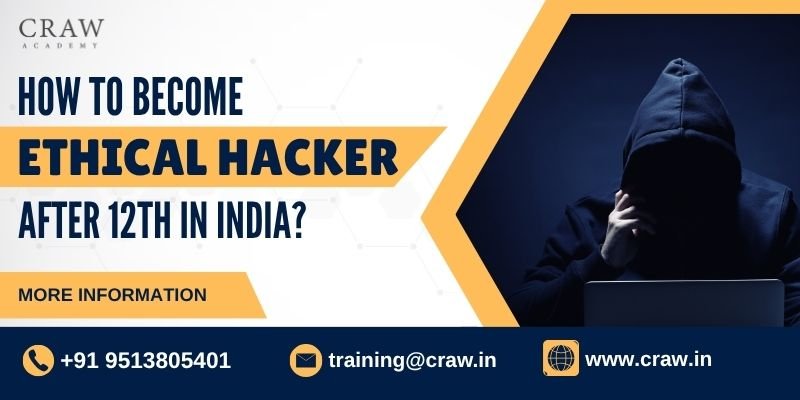How to Become an Ethical Hacker after 12th in India?
Are you fascinated by cybersecurity, hacking, and digital defense? Want to learn how to become an ethical hacker after completing your 12th in India? With the increasing demand for cybersecurity professionals, ethical hacking is a smart and rewarding career choice.
This comprehensive guide will walk you through the roadmap to becoming an ethical hacker after the 12th grade, covering the necessary qualifications, certifications, career paths, and expert tips to help you succeed.
What is ethical hacking?
Ethical hacking involves legally accessing computers and devices to test an organization’s security defenses. Ethical hackers, also known as “white hat hackers,” help businesses and governments find and fix vulnerabilities before malicious hackers can exploit them.
In short, ethical hacking is hacking with permission and for the right reasons.
Can You Become an Ethical Hacker After 12th?
Yes, you can! You don’t need to wait for a college degree to start your journey into ethical hacking. After completing your 12th (in any stream), you can enroll in professional courses, start gaining skills, and build your career from the ground up.
Step-by-Step Guide: How to Become an Ethical Hacker After 12th
Choose the Right Stream (Optional)
While ethical hacking is open to students from all backgrounds, opting for a science with computer science can be helpful if you’re still in school. It builds a strong foundation in programming and networking.
Join a Professional Ethical Hacking Course
Enroll in a certified ethical hacking course that offers hands-on training in tools like Kali Linux, Metasploit, Wireshark, Burp Suite, and others. Popular certifications include:
CEH (Certified Ethical Hacker)
- CompTIA Security
- EC-Council Certified Security Analyst (ECSA)
- Craw Security’s Ethical Hacking Course (highly recommended for beginners in India)
Learn Programming and Networking
To become a skilled ethical hacker, learn programming languages like
- Python
- JavaScript
- C/C++
- HTML, PHP (for web exploitation)
Also, master networking concepts like
- TCP/IP
- DNS
- Firewalls and VPNs
- Protocols (HTTP, FTP, SMTP)
Get Certified
Industry-recognized certifications validate your skills and improve job prospects.
CEH
- CompTIA Pentest+
- OSCP (Offensive Security Certified Professional)—Advanced
Practice with Real-World Labs
Use online platforms to test your skills in safe environments.
- Crack The Lab
- Hack The Box
- OverTheWire
These platforms simulate hacking environments that mimic real-world challenges.
Start Freelancing or Interning
Begin with internships or freelance gigs to gain real-world experience. Many companies are open to hiring ethical hackers as security analysts, penetration testers, or bug bounty hunters.
Career Options in Ethical Hacking After 12th
After building your skills, you can choose various roles in cybersecurity, including
- Security Analysis
- Malware Analyst
- Vulnerability Researcher
- Cybersecurity Consultant
Top companies hiring ethical hackers include Infosys, TCS, Wipro, IBM, Deloitte, and Indian defense organizations like CERT-In, DRDO, and NCIIPC.
Top Institutes Offering Ethical Hacking Courses in India
Craw Security (Delhi)—Offers beginner- to advanced-level CEH training with placement assistance.
Bytecode Security
Choose an institute that offers hands-on labs, certification prep, and job support.
Why Choose Ethical Hacking as a Career?
High Demand: Cyber threats are rising globally.
Attractive Salaries: Freshers can earn ₹4–6 LPA, while experienced professionals go up to ₹25 LPA+
Global Opportunities: Ethical hackers are needed in every sector.
Flexible Work Style: Many work remotely or as freelancers.
FAQs – How to Become an Ethical Hacker After 12th in India?
Q1. Can I become an ethical hacker without a degree?
Yes, certifications and skills matter more than a degree in this field.
Q2. What is the first step after the 12th?
Join a foundational ethical hacking course and start learning networking and programming.
Q3. Is ethical hacking legal in India?
Yes, if done with permission and for security purposes.
Q4. Which certification should I take first?
Start with CEH or CompTIA Security+ for beginners.
Q5. What is the minimum age to start ethical hacking?
You can start learning anytime after 16, but most certifications require 18+.
Q6. How long does it take to become a certified ethical hacker?
Anywhere between 6 months to 1 year, depending on the course and learning speed.
Q7. Can I pursue ethical hacking with a commerce background?
Yes, no specific stream is required.
Q8. Are online ethical hacking courses valid?
Yes, if they are from reputable platforms or instructors.
Q9. What are some free resources to start learning?
TryHackMe, Hack The Box, and YouTube channels like NetworkChuck and TheCyberMentor.
Q10. Are online certifications valid?
Yes, as long as they are from recognized platforms like EC-Council, CompTIA, etc.
Q11. Which tools should I learn?
Learn tools like Kali Linux, Nmap, Wireshark, Burp Suite, and Metasploit.
Q12. Can I get a remote job as an ethical hacker?
Yes, many companies hire remote cybersecurity experts and consultants.
Q13. Are internships available in this field?
Yes, many companies offer internships to freshers or students pursuing certifications.
Q14. Is it hard to become an ethical hacker?
With consistent practice and interest, it’s very achievable.
Q15. Can I start ethical hacking as a freelancer?
Yes, platforms like Bugcrowd, HackerOne, and Upwork offer freelance projects and bug bounties.
Final Thoughts
Starting your ethical hacking journey after the 12th is not only possible but also smart, especially in today’s digital-first world. With the right skills, certifications, and mindset, you can build a career that’s not just rewarding but impactful.
If you’re passionate about cybersecurity and ready to start, don’t wait—take your first step today.












































